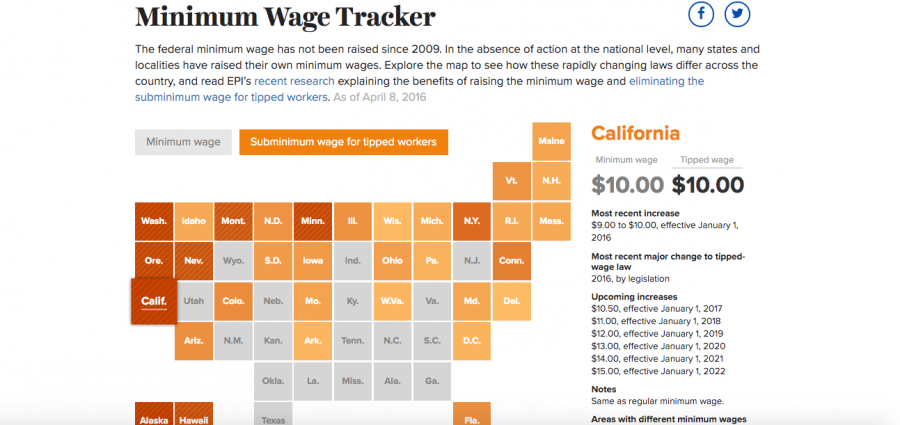$15 Minimum Wage
California and New York Have Signed The Bill to Raise Minimum Wage to $15. How Does This Affect Us?
April 11, 2016
Last week, California and New York signed the bill to raise minimum wage to $15. Gov. Andrew Cuomo and legislative leaders in Albany came to an agreement the state’s minimum wage should eventually be raised to $15 for everyone.The measure is included in the the state’s 2016-2017 budget package and was passed on Friday. He stated, “We believe that people who work hard should be able to earn a decent living and support a family with dignity.”
In January, Cuomo proposed a statewide $15 minimum wage back in January that represented a 67% increase over the New York’s $9 minimum. He estimated that raising minimum wage could directly benefit 2.3 million workers representing close to a quarter of the state’s workforce. The plan is for minimum wage to rise to $11 at the end of 2016 for most New York City businesses, and then increase by $2 each year until it hits $15 by the end of 2018. However, businesses with ten or fewer employees are allowed to have an extra year to implement the plan raising the wage by $1.50 instead of $2.
The budget division and labor department will assess the economy in each region and the effect of the minimum wage hikes annually to figure out if it’s necessary to temporarily suspend the scheduled increases starting in 2019. Those who support the increase highlight that by increasing wages for those who need it most, workers will be less likely to quit, which helps reduce turnover costs for employers. And the low-wage workers along with their colleagues who may also get an extra pay bump will spend more money in their local economy, which could cause a boost in demand and help create other jobs.
Gov. Jerry Brown of California signed a bill into law that will increase the statewide minimum wage to $15 per hour by the year 2022. Democratic State Senator Mark Leno, who cosponsored the bill states, “No one who is working full time in California should live in poverty due to a low wage.” The measure will raise the state’s minimum wage to $11 by January of 2018. It will then increase by an additional $1 per hour every year until it reaches $15 in 2022. If, however, the state goes through an economic downturn or budget crisis, the governor may choose to slow the implementation.
With New York, California marks an important move to try and close the national divide between “classes” and experts are saying that other states may follow soon.
According to president pro tempore Kevin De Leon, about 5.6 million people living in California currently live on the minimum wage. Making it the largest city to do so, LA agreed to increase the minimum wage to $15 per hour by 2020 and San Francisco plans to reach a $15 minimum by 2018. San Diego and Oakland have also decided to increase their minimum wages as well.
Cassandra Scigliano (10) voices her opinion and states “not every job is meant to produce a living wage. I think that raising the minimum wage would cause inflation and would be extremely detrimental to the economy.”
“California may be the first state to pass a $15 minimum wage, but it will also be the first to find out why that’s a bad idea,” said Michael Saltsman, research director of the Employment Policies Institute, a conservative think tank opposed to minimum wage hikes. Arguing that many businesses will have to cut staff or close because of the deal, Saltsman also says “this pain from a $15 minimum wage will only be exacerbated in more troubled counties in the state.”





































